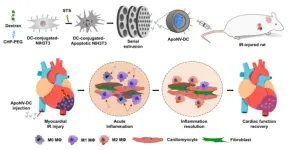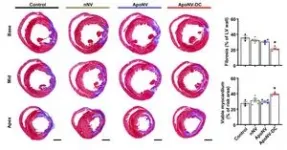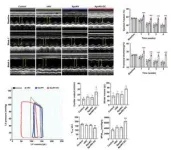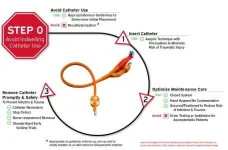(Press-News.org) Myocardial infarction, the number one cause of sudden death in adults and the number two cause of death in Korea, is a deadly disease with an initial mortality rate of 30%, and about 5-10% of patients die even if they are transported to a medical center for treatment. The number of myocardial infarction patients in Korea has been increasing steeply, from 99,647 in 2017 to 126,342 in 2021, an increase of 26.8% in five years. Until now, drug administration, percutaneous angioplasty, and arterial bypass surgery have been known as treatments, but they are difficult to apply to severe cases that do not respond to them.
Dr. Yoon Ki Joung and Dr. Juro Lee of the Biomaterials Research Center at the Korea Institute of Science and Technology (KIST), together with Prof. Hun-Jun Park and Dr. Bong-Woo Park of the Catholic University of Korea College of Medicine, have developed a new treatment for myocardial infarction that uses nanovesicles derived from fibroblasts with induced apoptosis to modulate the immune response.
Myocardial infarction is an ischemic heart disease in which the coronary arteries, the blood vessels that supply blood to the heart, become narrowed or blocked, resulting in insufficient blood supply to the heart muscle, which causes nutrient and oxygen deficiency in the myocardium, leading to poor heart function. According to market research firm Technavio, the global myocardial infarction therapeutics market is expected to reach $2.02 billion by 2026, at a CAGR of 4.7%. In recent years, stem cell-derived nanovesicles, such as exosomes, have been used to treat myocardial infarction by modulating the inflammatory response, but stem cells are difficult to produce in large quantities, limiting their economic viability.
The research team identified the possibility of treating severe myocardial infarction by reducing the inflammatory response in the heart muscle through a nanomedicine based on apoptotic cells, which are cells that commit suicide due to biochemical changes in their cells. This response was achieved by attaching peptides specific to the site of ischemic myocardial infarction and substances specific to macrophage phagocytosis to the surface of fibroblasts. To this end, the team developed anti-inflammatory nanovesicles that can be delivered specifically to macrophages at the site of myocardial infarction.
In animal studies, we found that intravenously injected nanovesicles were effectively delivered to the myocardial infarction site in rats and were specifically recruited to macrophages. As a result, the left ventricular ejection fraction, an indicator of the contractile force of the left ventricle, increased by more than 1.5 times compared to the control group for 4 weeks. In addition, the effects of reducing inflammation and fibrosis, and increasing blood vessels preservation rate enhanced cardiomyocytes survival, which resulted in cardiac function improvement.
"This is the first study to use nanovesicles produced from apoptosis-induced cells to treat myocardial infarction, and it has the advantage of being able to mass-produce them because it uses other cells rather than stem cells," said Dr. Yoon Ki Joung of KIST. "In the future, we plan to conduct a research to verify the effectiveness and safety of the treatment, including clinical trials, through a collaborative research with Catholic University of Korea Medical School and bio companies."
###
KIST was established in 1966 as the first government-funded research institute in Korea. KIST now strives to solve national and social challenges and secure growth engines through leading and innovative research. For more information, please visit KIST’s website at https://eng.kist.re.kr/
This research was supported by the Ministry of Science and ICT (Minister Lee Jong-ho) through the Korea Research Foundation Nano and Material Technology Development Project and the Sejong Science Fellowship Program, and the results were published in the June issue of Advanced Functional Materials (IF:19.0, JCR top 4.7%), an international journal in the field of materials.
END
Myocardial infarction, the number one cause of sudden death, may be treated by modulating the immune response.
- Reduced inflammation at the site of myocardial infarction and improved heart function demonstrated. Novel therapy to modulate immune response with apoptotic cell-derived nanovesicles.
2023-08-25
ELSE PRESS RELEASES FROM THIS DATE:
Alternatives to indwelling urinary catheters help patients avoid infections and urethral trauma
2023-08-25
ARLINGTON, Va. (August 25, 2023) — Avoiding the unnecessary use of indwelling catheters and promptly removing catheters that are no longer needed are the first steps in preventing catheter-associated urinary tract infections in acute care hospitals, according to new recommendations developed by five medical societies and published today in the journal Infection Control & Hospital Epidemiology.
“Urinary catheters can be associated with infection and also with non-infectious harms like trauma and obstruction,” said Payal Patel, M.D., an infectious disease physician at Intermountain Health and ...
UCLA researchers say embedding study recruitment in pre-appointment check-in may significantly boost participation
2023-08-25
FINDINGS
UCLA researchers find that they can electronically recruit patients for biomedical research at rates up to 40 times higher than the traditional method of patient portal messages by embedding study recruitment into the pre-appointment preCheck-in page.
BACKGROUND
While patient portal messages are increasingly used to recruit patients for research studies, this method typically results in study enrollment rates of 1-8%. In addition, this method of study recruitment has historically led to ...
New ‘promising medicines’ fund may incentivise commercialisation of high price drugs with weak evidence on clinical benefits
2023-08-25
A new fund to fast-track patient access to potentially valuable new medicines may incentivise the pharmaceutical industry to develop high priced drugs for rare diseases with weak evidence on clinical benefits.
Health economics and policy academics from the London School of Hygiene & Tropical Medicine (LSHTM), writing in the Journal of the Royal Society of Medicine, warn that if the NHS England Innovative Medicines Fund (IMF) is not implemented appropriately, it risks disincentivising the generation of essential evidence and could shift the financial burden from the pharmaceutical industry to the public finances.
The IMF operates on similar terms to ...
Certain gut conditions may be early warning signs of Parkinson’s disease
2023-08-25
Certain gut problems, such as constipation, difficulty swallowing, and irritable bowel syndrome (IBS), may be early warning signs of the neurological condition Parkinson’s disease, suggests research published online in the journal Gut.
Gastrointestinal symptoms are thought to precede the development of cerebrovascular disease, such as stroke or a brain aneurysm, or Alzheimer’s disease, and it has been suggested (Braak’s hypothesis) that gut conditions may precede the development of Parkinson’s disease too.
To ...
Poor lifestyle of over 60s linked to heightened risk of nursing home care
2023-08-25
Over 60s with the unhealthiest lifestyles are significantly more likely to require admission to a nursing home than their peers with the healthiest lifestyles, suggest the findings of a large population study published online in the Journal of Epidemiology & Community Health.
Physical inactivity, smoking, poor diet and sleep disorders between the ages of 60 and 64 seemed to be particularly influential: they were associated with a more than doubling in the risk of admission, the findings show.
Modifiable lifestyle risk factors are associated with the development and progression of several long term conditions, ...
Beverage Plant Research indexed in CABI
2023-08-25
We are delighted to announce that the Beverage Plant Research articles are now indexed in CABI specialized databases. This important milestone ensures that articles published in Beverage Plant Research are easily found when searching for beverage plant literature and it enables this journal authors to keep track of how often their article has been cited by others. According to the correspondence made by CABI, the Beverage Plant Research will be indexed from Volume 1, 2021.
About Beverage Plant Research
Beverage Plant Research (e-ISSN: ...
Paper drinking straws may be harmful and may not be better for the environment than plastic versions, researchers warn
2023-08-25
“Eco-friendly” paper drinking straws contain long-lasting and potentially toxic chemicals, a new study has concluded.
In the first analysis of its kind in Europe, and only the second in the world, Belgian researchers tested 39 brands of straws for the group of synthetic chemicals known as poly- and perfluoroalkyl substances (PFAS).
PFAS were found in the majority of the straws tested and were most common in those made from paper and bamboo, the study, published ...
Sediment movement during Hurricane Harvey could negatively impact future flooding, prove costly to Houston, UH study finds
2023-08-25
Enormous amounts of sediment, or sand and mud, flowed through Houston waterways during Hurricane Harvey in 2017, due in part to modifications made by humans to bayous, rivers and streams over the past century, that could seriously impact future flooding events and be costly to the City of Houston.
New analysis by geology researchers at the University of Houston found 27 million cubic meters of sediment, or 16 Astrodomes, moved through 12 Houston waterways and Addicks and Barker reservoirs during Harvey, the largest rainfall event in U.S. history. After the storm, up to five feet ...
USC-supported startup receives major grant for clinical trial of a promising eye treatment
2023-08-24
A stem cell patch developed by USC researchers for patients with macular degeneration will soon be tested in a phase 2b clinical trial.
This latest milestone in the patch’s development was made possible by a combined $21 million in support from a state organization, a nonprofit foundation and the university. Last month, the California Institute for Regenerative Medicine (CIRM) awarded an estimated $12.4 million to the USC-supported startup Regenerative Patch Technologies (RPT) to test the safety and efficacy ...
New detector paves the way to large-scale optical neural networks
2023-08-24
For the first time, researchers have used a surface normal nonlinear photodetector (SNPD) to improve the speed and energy efficiency of a diffractive optical neural network (ONN). The new device lays the groundwork for large-scale ONNs, which can perform high-speed processing at the speed of light in an extremely energy efficient manner.
Farshid Ashtiani from Nokia Bell Labs will present this research at Frontiers in Optics + Laser Science (FiO LS), which will be held 9 – 12 October 2023 at the Greater Tacoma Convention ...
LAST 30 PRESS RELEASES:
$3 million NIH grant funds national study of Medicare Advantage’s benefit expansion into social supports
Amplified Sciences achieves CAP accreditation for cutting-edge diagnostic lab
Fred Hutch announces 12 recipients of the annual Harold M. Weintraub Graduate Student Award
Native forest litter helps rebuild soil life in post-mining landscapes
Mountain soils in arid regions may emit more greenhouse gas as climate shifts, new study finds
Pairing biochar with other soil amendments could unlock stronger gains in soil health
Why do we get a skip in our step when we’re happy? Thank dopamine
UC Irvine scientists uncover cellular mechanism behind muscle repair
Platform to map living brain noninvasively takes next big step
Stress-testing the Cascadia Subduction Zone reveals variability that could impact how earthquakes spread
We may be underestimating the true carbon cost of northern wildfires
Blood test predicts which bladder cancer patients may safely skip surgery
Kennesaw State's Vijay Anand honored as National Academy of Inventors Senior Member
Recovery from whaling reveals the role of age in Humpback reproduction
Can the canny tick help prevent disease like MS and cancer?
Newcomer children show lower rates of emergency department use for non‑urgent conditions, study finds
Cognitive and neuropsychiatric function in former American football players
From trash to climate tech: rubber gloves find new life as carbon capturers materials
A step towards needed treatments for hantaviruses in new molecular map
Boys are more motivated, while girls are more compassionate?
Study identifies opposing roles for IL6 and IL6R in long-term mortality
AI accurately spots medical disorder from privacy-conscious hand images
Transient Pauli blocking for broadband ultrafast optical switching
Political polarization can spur CO2 emissions, stymie climate action
Researchers develop new strategy for improving inverted perovskite solar cells
Yes! The role of YAP and CTGF as potential therapeutic targets for preventing severe liver disease
Pancreatic cancer may begin hiding from the immune system earlier than we thought
Robotic wing inspired by nature delivers leap in underwater stability
A clinical reveals that aniridia causes a progressive loss of corneal sensitivity
Fossil amber reveals the secret lives of Cretaceous ants
[Press-News.org] Myocardial infarction, the number one cause of sudden death, may be treated by modulating the immune response.- Reduced inflammation at the site of myocardial infarction and improved heart function demonstrated. Novel therapy to modulate immune response with apoptotic cell-derived nanovesicles.






